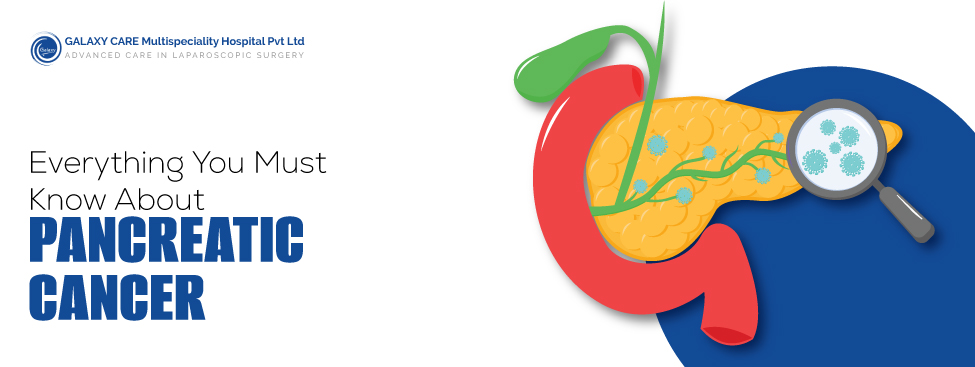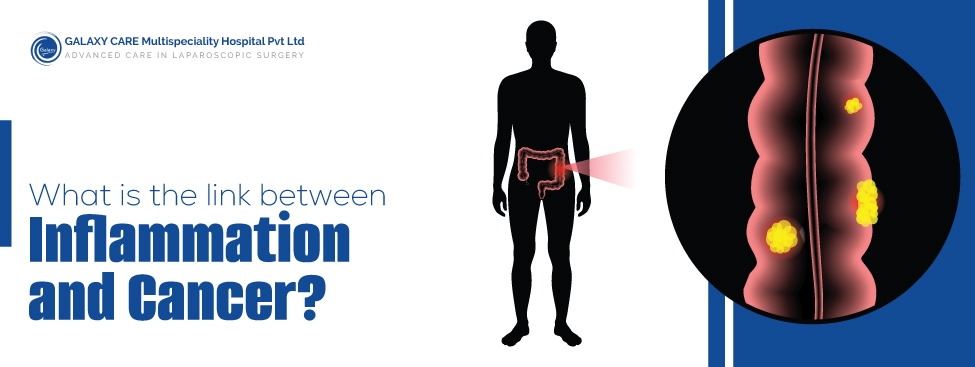
Everything You Must Know About Pancreatic Cancer
Pancreatic cancer is a devastating and often silent disease that deserves attention due to its severity and high mortality rate. It typically remains undiagnosed until it reaches an advanced stage, making early detection challenging. Understanding pancreatic cancer in terms of its risk factors, symptoms, diagnostics, and treatment options is essential for taking timely action. For residents of Pune and the surrounding areas, consulting a Pancreatic Cancer Specialist in Pune at a leading facility like Galaxy Care Hospital can make a world of difference.
Let’s delve into the details and explore everything you need to know about pancreatic cancer.
What is Pancreatic Cancer?
The pancreas is a vital organ located behind the stomach, playing crucial roles in digestion and blood sugar regulation by producing hormones like insulin and enzymes. Pancreatic cancer occurs when cells in the pancreas grow abnormally and uncontrollably, forming malignant tumors. This type of cancer often begins in the ducts of the pancreas (pancreatic ductal adenocarcinoma), though rarer types can originate in the hormone-producing cells.
One of the major reasons pancreatic cancer is so dangerous is that it is hard to detect early. Symptoms typically emerge late, and by this time, the disease has often advanced to a stage where effective treatment becomes more complex.
Risk Factors of Pancreatic Cancer
A number of risk factors—both genetic and environmental—can increase the likelihood of developing pancreatic cancer. Here is a detailed exploration of these factors:
1. Age and Gender
- People above the age of 60 are more likely to develop pancreatic cancer. The disease is rare in younger individuals.
- Statistically, pancreatic cancer is slightly more common in men than women, possibly due to lifestyle factors.
2. Family History and Genetics
- Those with a family history of pancreatic cancer have a higher risk of developing the disease. Genetic syndromes such as Lynch syndrome, BRCA mutations (commonly associated with breast and ovarian cancers), and familial pancreatitis can also elevate the risk.
- Testing for genetic mutations is vital for individuals with a strong family history of cancer.
3. Chronic Health Conditions
- Chronic inflammation of the pancreas (chronic pancreatitis) is a significant risk factor.
- Diabetes, especially newly diagnosed diabetes in older individuals, can sometimes indicate an increased risk of pancreatic cancer.
4. Lifestyle and Environmental Factors
- Smoking: Smokers are twice as likely to develop pancreatic cancer compared to non-smokers. The risk decreases after quitting but requires many years of abstinence to return to normal levels.
- Obesity: Excess body fat has been linked to an increased risk of pancreatic cancer, likely due to chronic low-grade inflammation and insulin resistance.
- Dietary Habits: Diets high in red or processed meats, fat, and sugar, along with low fruit and vegetable consumption, may contribute to a heightened risk.
- Alcohol Consumption: While not a direct cause, heavy and prolonged alcohol use can lead to chronic pancreatitis, increasing the risk of developing pancreatic cancer.
5. Exposure to Chemicals
- Occupational exposure to certain chemicals, such as those in the metalworking, petroleum, or dye industries, also elevates risk.
6. Infections
- Chronic infections, such as Helicobacter pylori or hepatitis B and C viruses, may have minor associations with pancreatic cancer risk, though more research is required.
Recognizing these risk factors is the first step in prevention or early detection. If any of these apply to you, consider consulting a Pancreatic Cancer Specialist in Pune for screening or further evaluation.
Symptoms of Pancreatic Cancer
One of the challenges of pancreatic cancer lies in its lack of noticeable symptoms in the early stages. Symptoms often appear only after the cancer has progressed significantly. Here is a detailed overview of the symptoms that patients may experience:
1. Jaundice
- Yellowing of the skin and eyes occurs in many cases because pancreatic tumors block the bile duct, preventing proper bile drainage. Jaundice is often accompanied by dark urine, pale stools, and itchy skin.
- If you notice jaundice, it is crucial to seek medical attention immediately for evaluation.
2. Unexplained Weight Loss
- Significant and unintended weight loss is a common symptom of pancreatic cancer. Weight loss can occur due to poor digestion caused by pancreatic insufficiency or loss of appetite associated with cancer.
3. Abdominal and Back Pain
- Pain that starts in the abdomen and may radiate to the back is one of the hallmark symptoms of pancreatic cancer. It typically occurs when the tumor presses on nearby organs or nerves.
4. Digestive Issues
- Pancreatic cancer often prevents the pancreas from producing enough enzymes necessary for efficient digestion of food, leading to symptoms like bloating, nausea, diarrhea, or greasy stools (steatorrhea).
5. New-Onset Diabetes
- Sudden-onset diabetes, particularly in individuals without prior history or risk factors for the disease, can be an early sign of pancreatic cancer. If you notice unusual blood sugar fluctuations, especially at an older age, consult your doctor promptly.
6. Fatigue
- Persistent fatigue and a feeling of being unwell are common but nonspecific symptoms of pancreatic cancer and warrant further investigation.
7. Blood Clots
- Cancer patients may be at a higher risk of clot formation. The presence of deep vein thrombosis (swelling, pain, and redness in the leg) or pulmonary embolism (shortness of breath and chest pain) may signal cancer, including pancreatic cancer.
8. Changes in Stool and Urine
- Pale, greasy, or foul-smelling stools and dark-colored urine are signs that pancreatic disease is interfering with bile and fat absorption.
Because these symptoms often overlap with other conditions, timely consultation with specialists experienced in dealing with pancreatic cancer is key. Galaxy Care Hospital in Pune has expert oncologists equipped with advanced diagnostic tools to pinpoint the cause effectively.
Diagnosis of Pancreatic Cancer
Early diagnosis of pancreatic cancer is challenging, but recent advancements in imaging and biopsy procedures have improved detection capabilities. Diagnostic methods include:
- Imaging Tests: CT scans, MRI, PET scans, or endoscopic ultrasounds to obtain a detailed image of the pancreas and surrounding areas.
- Blood Tests: CA19-9 is a tumor marker often elevated in pancreatic cancer, although it is not definitive.
- Biopsy: Tissue samples obtained during endoscopic procedures confirm the diagnosis.
Galaxy Care Hospital utilizes state-of-the-art technology, including robotic diagnostic tools, to ensure accurate and minimally invasive evaluations.
Treatment Options at Galaxy Care Hospital
When it comes to treatment, a multidisciplinary approach is essential. At Galaxy Care Hospital, patients benefit from cutting-edge technology, skilled specialists, and compassionate care. Treatment options include:
- Surgery: If the cancer is detected early, surgical removal of the tumor (Whipple procedure, distal pancreatectomy, or total pancreatectomy) may be performed.
- Radiation Therapy: Targeted radiation can shrink tumors or eliminate cancer cells post-surgery.
- Chemotherapy: Often used in combination with radiation or as standalone therapy to treat advanced-stage cancers.
- Robotic Surgery: Robotic surgery is among the best treatment options, offering precision, faster recovery, and fewer complications.
Choose Galaxy Care Hospital for Pancreatic Cancer Treatment
Pancreatic cancer is a challenging disease, but early awareness of the risk factors, symptoms, and treatment options can greatly improve outcomes. Timely diagnosis and expert management are crucial in ensuring treatment success. For residents of Pune and beyond, Galaxy Care Hospital offers state-of-th-art medical facilities—including Laparoscopic surgery, Robotic surgery, and a team of experienced oncologists to guide each patient through their battle with cancer. If you or your loved one is facing a pancreatic cancer diagnosis, do not delay. Consult the finest Pancreatic Cancer Specialist in Pune at Galaxy Care Hospital. With state-of-the-art diagnostics, advanced surgeries, a multidisciplinary team, and compassionate care, Galaxy Care Hospital sets the gold standard for cancer treatment. Reach out to us today and let us help you fight pancreatic cancer with the confidence and expertise you deserve.
SUMMARY:
Pancreatic cancer is often called a silent killer, but early awareness can save lives. Dive into our latest blog, Everything You Must Know About Pancreatic Cancer, crafted by the finest Pancreatic Cancer Specialist in Pune at Galaxy Care Hospital. Read the full blog now!


